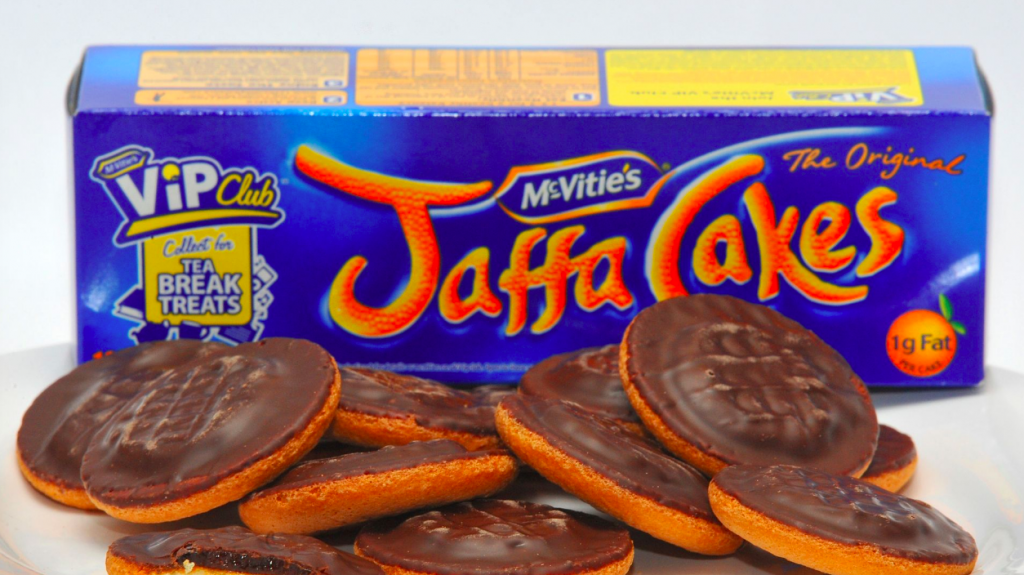The Great Cookie– er, Biscuit– er, Cake Debate of 1991

If you’re in the United States and want to start a stupid debate, gather a dozen or so people and ask a simple question: is a hot dog a sandwich? There are good arguments to be made on both sides (and this article on the topic is fun), but for our purposes, it’s not that important. Whether a hot dog (on a bun, of course; a hot dog minus the bun is clearly no sandwich) is a sandwich has little implication on anything meaningful. So let’s simply acknowledge that there is a debate and move on.
On to cookies, that is. Or are they cakes?
Pictured above are Jaffa Cakes, a popular snack in the United Kingdom. They feature a layer of sponge cake topped with orange jam, all covered with a chocolate coating. You don’t typically buy them individually, at least not at the grocery store; there, they come ten or 12 to a pack. To give you an idea for how big they are, each Cake — let’s keep that “C” capitalized, for reasons you’ll see shortly — runs about 50 calories, which is about the same as an Oreo cookie.
It’s understandable, therefore, why some may consider Jaffa Cakes to be cookies (or, in UK parlance, biscuits). They’re the size of cookies, they’re meant to be eaten in the same way one eats cookies (i.e. without a fork), and in similar quantities (i.e. one or two, unless you’re having a really bad day, in which case just eat the whole box.)
If you’re McVitie’s — the makers of Jaffa Cakes — you have very good reason to want them to be cakes, though: taxes. In 1973, the UK instituted a “value-added tax” or VAT — basically, a more extensive version of what us in the United States call a “sales tax” — to just about everything. But there are some exceptions, of course. As explained by the UK government on this page (in section 3.4), “most traditional bakery products, such as bread, biscuits and cakes, are zero-rated” (that is, they’re untaxed). But there are also exceptions to the exceptions. In this case, “biscuits wholly or partly covered in chocolate” should be taxed. To make the issue exceptionally clear, the rule does not say that “cakes wholly or partly covered in chocolate” are taxed — only biscuits are.
So if Jaffa Cakes are a cake, they come without a VAT charge. If they’re cookies/biscuits, consumers would pay less. And in 1991, this all came to a head. As the BBC reported, “the manufacturer, McVities, had always categorized them as cakes, and to boost their revenue the tax authorities wanted them recategorized as biscuits.” The matter went to the courts, which applied an 11-element analysis to the question. Two of the elements — the name of the product and how they’re manufactured — were deemed unimportant. (McVitie’s argument, therefore, that they’re cakes because they’re Cakes didn’t go very far.) The size of the Cakes, their package, and their presentation were all considered very un-cake-like. Similarly, the court found that the marketing of the product, the name notwithstanding, was very biscuit-ish, as the Cakes were often found near biscuits in the grocery store. And finally, in the “they’re a biscuit” category, was the fact that they were marketed toward children; for some reason, under UK law, children like cookies but not cake.
However, if you’re counting, that is only seven of the eleven elements. And the other four were very much in the “it’s a cake!” column. First, the ingredients are very cake-like — sponge cake being the base makes that clear. Second, the “core ingredients” are things you’d find in cake; that is, the sponge cake makes up a large percentage of the volume of the product. Next is the texture: Jaffa Cakes are soft, unlike biscuits, which are supposed to be crispy or crunchy. (Apparently, soft-baked cookies aren’t historically popular in the UK.) And finally, and perhaps most importantly, the court looked at what happens when Jaffa Cakes go stale. Biscuits, they reasoned, get softer when stale; cakes get hard. So they left some Jaffa Cakes out for a bit and took a bite after they went stale — only to find that they, like the cakes they were named after, also became hard.
Despite the scoreboard — five points for “biscuit,” four for “cake,” and two “meh, we don’t really care — the court decided that the cake-y characteristics were enough to give McVitie’s the win. If you buy some Jaffa Cakes in the UK, therefore, you don’t have to pay VAT. Just don’t get caught calling them “biscuits.”
Bonus fact: American direct-to-consumer wholesaler Costco has sold hot dogs (like, on a bun and ready to eat) for $1.50, and has at that price since at least 1985. It’s likely that the price will remain at that level, too. According to Mental Floss, the CEO of the company, W. Craig Jelinek, told the founder, Jim Sinegal, that Costco was losing money on the six-quarter dog deal and wanted to raise the price. Sinegal wouldn’t hear it, saying “if you raise [the price of] the effing hot dog, I will kill you. Figure it out.” To date, Jelinek hasn’t raised the price and Sinegal has not killed him.
From the Archives: When a Court Ruled Whether the X-Men Are Human: Another fun tax question. (See, taxes can be fun!)
